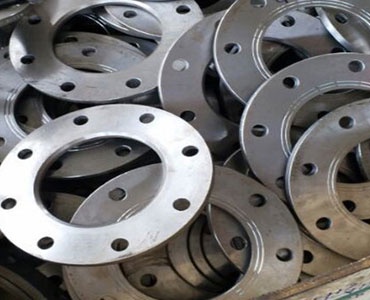Incoloy 800 Flanges are fabricated from nickel-iron-chromium alloys that are highly resistant to corrosion in numerous environments. Incoloy 800 Flanges are widely used in chemical processing, pollution control, oil and gas recovery, acid production, pickling operations, nuclear fuel reprocessing, & handling of radioactive wastes.
The chromium and nickel content of alloy 800 provides resistance to corrosion, while the iron content allows for ductility. This combination of properties is a primary reason why alloy 800 is often chosen for equipment that must resist oxidation, carburization, & other harmful effects of high-temperature exposure.
These characteristics of alloy 800 make it the preferred material for many applications in the petrochemical, nuclear, oil and gas, and power industries. It also exhibits high strength & toughness at elevated temperatures.
Alloy 800 Flanges can be welded using the same techniques as other austenitic stainless steels. These include MIG, TIG, and shield metal arc welding. They can be used in hot and cold applications, although hot welding is recommended for applications with higher strength.
They can be annealed and heat treated to improve their corrosion resistance. They are also available in an extended range of sizes.
These flanges have excellent resistance to chloride stress corrosion cracking, embrittlement from precipitation of the sigma phase, and hydrocarbon cracking. They are also highly resistant to pitting and crevice corrosion.
The flanges have a joint ring design and are commonly used in pulp, paper-making machines, boilers, steam and water heaters, and heat-treating equipment. These flanges also can be used in high-temperature chemical processing.
Incoloy 800 Flanges are available in a variety of styles and designs. They can be installed as a slip-on or weld neck type and may be threaded or blind. In addition, they can be forged or cut to custom sizes and lengths.
Unlike other standard austenitic stainless steels, these flanges are highly durable at elevated temperatures. They are highly durable because they have superior tensile and elongation strength, achieved through aging and hardening the material. As a result, they can withstand up to 1500 degrees Fahrenheit.
They are also highly resistant to phosphoric and sulfuric acids, making them ideal for industrial applications involving chemical deterioration or pollution control. In addition, they are immune to oxidizing and reducing acids, as well as localized attacks from the crevice and pitting corrosion.
These flanges are designed to meet the specifications of ASTM B166 and ASME SB166. They are available with both threaded and non-threaded threads and can withstand high pressure.
The flanges are made from a nickel-iron-chromium alloy with added molybdenum, copper, and titanium. The chemical composition of the alloy provides excellent resistance to many corrosive environments, including acid, salt, and chlorine gas.


No comments yet